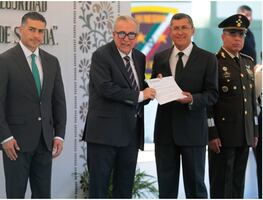Más Información

Videojuegos, el nuevo gancho del crimen para captar menores; los atraen con promesas de dinero y poder

“Vamos a dar apoyo a los pequeños agricultores por sequía en Sonora”; Claudia Sheinbaum instruye a Berdegué

Derrota de México en disputa por maíz transgénico contra EU; estos son los argumentos de Sheinbaum y AMLO para prohibirlo
A historian from the National Autonomous University of Mexico (UNAM) , Margarita Meza Ghenno used to work at Mexico City’s Museum of Tolerance until her travels led her to Rwanda, Africa , where she had to gather testimonies from the survivors of the Rwandan genocide of 1994 .
As she learned of the horrors of genocides around the world, she decided to turn her life around and start her own company. Her line of business? Fashion and sustainability.
In 2012 , Meza Ghenno started her own fashion company, with products made out of a fabric that is 50% recycled cotton and 50% PET (polyethylene terephthalate) , an oil based material that takes between 500 and 1,000 years to disintegrate .
The transformation of plastic to fabric entails a very long process that consists of collecting PET bottles, sort them by color, and then wash and disinfect the synthetic material. Later on, the material is shredded to produce small flakes that are then processed to obtain the fiber: Small filaments that may also be used to fill cushions.
In order to wash it, one need only use 4 liters of water per kilo of PET fabric , unlike cotton fabrics which require around 32 liters of water per kilo, not to mention that the new synthetic fabric is antibacterial, due to the aforementioned process.
Though the graduate from UNAM is still working on raising funds for a nonprofit institution called Casa Alianza , which is dedicated to providing care for teenagers who have faced violence and economic abandonment, she is confident that her company will be able to grow and provide for her and her family.
Meza Ghenno believes that investing in sustainable alternatives for the textile industry is of great importance, since “the textile industry is one of the most polluting industries worldwide, it is underpaid, and has poor working policies.”
With this in mind, she is very careful about promoting sustainable practices, even with her suppliers. For instance, both the company that makes the clothes, located in Ixtapaluca , and the manufacturer in Yucatán , which supplies the fabrics for T-shirts , are certified before the Global Recycle Standard , which guarantees that a textile product undergoes a sustainable process from beginning to end.
Furthermore, both companies use only Mexican PET bottles, which helps them achieve their purpose of helping the country. For the time being, Margarita has also considered associating with a Philippine company dedicated to making imitation leather with pineapple peels, while other companies such as Africam Safari and Natura have already taken an interest in her work.
“What we want is to create a sustainable product and give something back while contributing to solve the Earth’s problems,” she stated.
dm








